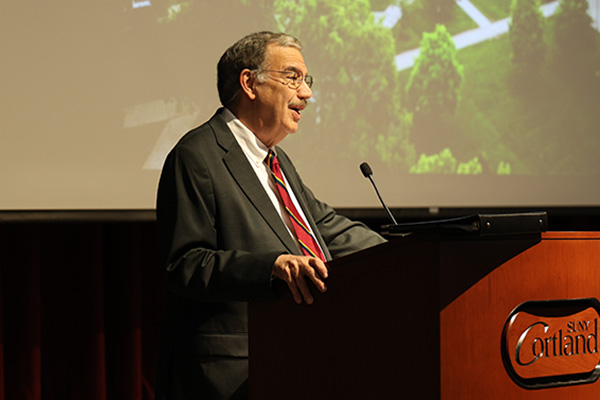
08/20/2025
SUNY Cortland President Erik J. Bitterbaum welcomed faculty and staff members for the Fall 2025 semester with remarks celebrating institutional successes and touching on several topics, from artificial intelligence to the needs of students in Generation Z.
Addressing a crowd of more than 300 faculty and staff members in the Corey Union Function Room on Aug. 20, Bitterbaum shared personal stories along with campus updates from the summer. The president also outlined challenges facing higher education institutions and the importance of collaboration in the year ahead.
Building meaningful, direct mentoring relationships with students remains an institutional priority, Bitterbaum said. In his opening, he shared a letter from a recent graduate who overcame mental health challenges during their Cortland experience because of support from faculty and staff mentors.
“(The alum’s letter) really is indicative of who you are, as faculty and staff making a difference,” he said.
That mentoring relationship often proves timeless, especially in the president’s interactions with graduates.
“When I visit with alums, two of the most significant things they talk about are undergraduate research — or having a mentoring relationship with a faculty member — and their international experiences,” Bitterbaum said.
Both of those topics were touched on during the president’s overview of recent institutional successes. Among the highlights he shared:
-
During the summer, 13 students and faculty mentors across various disciplines were supported by donor-funded research fellowships established through the Cortland College Foundation.
-
Recent study abroad opportunities spanned the university’s first official program in Colombia, a sport management work experience at the FISU World University Games in Germany, an immersive art lesson in Dingle, Ireland, an ecotourism course in Thailand and archaeology research in Turkey.
-
Multiple faculty members have secured national grants. An award worth $73,315 from the U.S. Geological Survey will continue work to study a native deepwater prey fish community through research led by Andrea Davalos, associate professor of biological sciences, Li Jin, professor of geology and Mary Beth Voltura, associate professor of biological sciences. Katherine Hicks, professor of chemistry, has earned a $64,266 grant from the National Science Foundation. Her collaborative research project will investigate how a specific family of enzymes rearranging catecholic carbon found in plants could lead to the production of natural products with therapeutic properties. A $25,000 award earned through the Teagle Foundation’s “Cornerstone: Learning for Living” initiative will help support a multidisciplinary intellectual experience for new students. That effort involves Andrea Harbin, professor of English, Anisha Saxena, assistant professor of history, Kevin Sheets, professor of history, and Benjamin Wilson, associate professor of economics.
-
The university now shares a partnership with SUNY Upstate Medical University that allows Cortland students to graduate with a bachelor’s degree in exercise science and a Doctor of Physical Therapy degree in less than six years.
-
Plans for a new SUNY Cortland Entrepreneurship Center underscore a commitment to local economic development and students interested in business.
-
Summer campus construction and renovations improved areas from residence halls to building entrances. The university’s major renovation of the C-wing connecting Cornish and Van Hoesen halls remains on schedule for completion in January, bringing new space for student support services and hands-on learning outlets for the Communication and Media Studies Department.
In looking towards the future, Bitterbaum suggested that recommendations from the university’s ad-hoc committee on generative artificial intelligence and student writing can provide valuable faculty resources. Just as important are the needs of students in Generation Z — those born between 1997 and 2012 who often are associated with digital abilities, social consciousness and pragmatic approach to higher education. Their well-being remains a high priority.
“Early connections help build confidence,” he said. “The more connected they are to you, our faculty and staff, the better likelihood they’re going to have a good outcome.”
The president also shared examples of challenges faced by colleges and universities across the U.S., from funding uncertainty to new requirements for higher education institutions. He recalled lessons learned from the Great Recession from 2007 to 2009 and the COVID-19 pandemic, explaining the importance of committee work informed by employee expertise.
“Your knowledge helped us get through a very difficult time — I look back and marvel at what we were able to do,” said Bitterbaum, entering his 23rd year at SUNY Cortland, which makes him the longest-serving president in the SUNY system. “There was a lot of brilliance in this room and across the campus. We will get through it once again.”
He emphasized the importance of living well in his concluding remarks — finding joy in the ordinary, not stewing on minor inconveniences and pursuing ambitions that are within reach.
“My wish and hope for all of you is to enjoy this coming academic year,” Bitterbaum said. “And may you find joy in your students and colleagues.”